In this topic, we focus on depression and the effects it can have on individuals and their participation and adherence in sport and exercise. You will learn about:
- Depression and its contributing factors
- Signs and symptoms of depression
- Different forms of depression
- Strategies to overcome depression
- Myths surrounding depression
- Support options available
Terminology and vocabulary reference guide
As an allied health professional, you need to be familiar with terms associated with basic exercise principles and use the terms correctly (and confidently) with clients, your colleagues, and other allied health professionals. You will be introduced to many terms and definitions. Add any unfamiliar terms to your own vocabulary reference guide.
Activities
There are activities throughout the topic and an end of the topic automated quiz. These are not part of your assessment but will provide practical experience that will help you in your work and help you prepare for your formal assessment.
A mental health disorder characterised by persistently depressed mood or loss of interest in activities, causing significant impairment in daily life.Mayo Clinic
Depression is an increasingly common mental illness which affects millions of people globally. This condition, which is linked to changes in brain activity, can lead to forgetfulness, mood swings, loss of interest in daily activities, and persistent sadness as well as many other possible signs or symptoms. These can vary between individuals and in turn, can have an impact on several aspects on an individual’s day to day activities.
Depression can start at any age – from childhood through to old age. It usually starts in the mid-20s, and it is more common in the 25 to 45-year-old age group, however, depression and its counterpart- anxiety, can affect a range of individuals, for example:
- 1 in 7 will experience depression before they are 24 years old
- 1 in 8 men will experience depression
- 1 in 5 women will experience depression
- 1 in 4 New Zealanders will experience anxiety
- 1 in 5 people with depression or anxiety will experience both at the same time.
Depression is typically caused by a combination of biological, psychological and social sources of distress which can include a huge range of negative feelings and is often a very unique and personal experience for each individual. The following are some (not all) factors which may accelerate the onset of depression:
- Stressful events like the break-up of a relationship or financial trouble
- A family history of depression
- Physical illness, such as a stroke or heart attack
- Stressful or traumatic events in childhood can lead to depression later in life
- Certain medications can cause depression in some people
- Social isolation – i.e. having no friends or family near you.

Symptoms of depression will vary between individuals as each person will have a different experience of the condition. The following points represent some of the main, associated and physical signs and symptoms to look out for whilst keeping in mind that these examples are not indicative of an exhaustive list.
Main signs and symptoms (include but not limited to):
- Feeling down, persistently sad or hopeless
- Having little interest or pleasure in activities which would usually be found as enjoyable (anhedonia)
- Early morning awakening, typically waking before alarm (occurs in approximately 90% of sufferers).
Additional associated signs and symptoms (include but not limited to):
- Irritability/mood swings
- Tearfulness
- Low self-esteem/low motivation
- Difficulty concentrating
- Memory difficulties
- Reduced sex drive (libido)
- Feelings of emptiness or loneliness
- Feelings of worthlessness
- Feelings of despair
- Thoughts of self-harm or suicide.
Physical signs and symptoms (include but not limited to):
- A pounding heart
- Stomach cramps
- Loss of energy
- Significant weight loss or weight gain
- Fatigue
- Sleep problems
- Changes in appetite.

There is no one-size-fits-all when it comes to depression, everyone’s experience is unique and personal to them. The following are example of different forms of depression that an individual can experience. Click on each to find out more.
Clinical depression is typically characterised by low mood and/or loss of interest and pleasure in usually enjoyable activities. Such symptoms are typically experienced most days and last for at least two weeks and will have an impact on most areas of an individual’s personal, work and social interactions. Research has shown that depression can range in severity with clinical depression representing the more severe form of the condition, also referred to as major depression. It's important to note that this form of depression is not the same as depression which can arise as a result of a medical condition such as thyroid disorders or the loss of a loved one or family pet.
This represents a severe form of depression where many of the physical symptoms of depression are present. One of the major changes is that the person starts to move more slowly and they are also more likely to have a depressed mood that is characterised by complete loss of pleasure in everything, or almost everything.
A term used to describe people with a depressive disorder who lose touch with reality and experience psychosis. This can involve hallucinations or delusions and can also lead to the feeling of paranoia, the feeling that everyone is against them or that they are the cause of illness or bad events occurring around them.
Refers to clinical depression during and or post pregnancy, often evident in the days immediately following birth. Emotions at this time can be complex with many women experiencing 'baby blues’, a common condition related to hormonal changes (affects up to 80% of women).
This is also known as 'manic depression' because the person experiences periods of depression and periods of mania (an extremely elevated and excitable mood), with periods of normal moods in between. Bipolar disorder seems to be most closely linked to family history, affecting approximately 2 per cent of the population.
A mood disorder that has a seasonal pattern. It is characterised by mood disturbances that begin and end in a particular season and is thought to be related to the variation in light exposure. More likely to be found in countries with shorter days and longer periods of darkness, such as in the cold climate areas of the Northern Hemisphere.

There are several different strategies and techniques a person can utilise to assist with depression. Typically, the earlier these are adopted, the better the chances of success. Carefully following the prescribed support plan is vital in overcoming depression and preventing its recurrence. Strategies which have been shown to be of benefit are:
- Self-help techniques
- Psychological therapies
- Psychoeducation
- Complementary/alternative therapies
- Holistic wellbeing strategies.
Remember, in the world of health and fitness, your role is to work within your scope of practice, therefore it is not your role to diagnose nor recommend a particular type of therapy or treatment. You can, however, discuss options to support your client in seeking further advice.
Let's look at each of these strategies in more detail.
Self-help techniques
There are a number of techniques than can be implemented into daily life to support the feelings and symptoms of depression, take a look at the following examples which can be useful strategies to discuss with your clients.
- Regular exercise
- Maintaining a healthy, balanced diet
- Reducing alcohol, caffeine, and tobacco intake
- Having a regular bedtime and waking up time
- Recognising when time out is needed, and taking it
- Making time to undertake an enjoyable activity each day
- Asking for and/or accepting support from friends and families to achieve self-help goals.
Psychological therapies
There are a range of therapies which may assist with coping and overcoming depression. Therapy sessions are not suited for everyone but may be helpful for some people, it is however always advised to seek an expert’s opinion.

- Cognitive behavioural therapy (CBT): This type of therapy takes the approach of a positive, goal-orientated problem-solving approach. It involves helping a person to change negative ways of thinking and behaving that are associated with their depression.
- Interpersonal psychotherapy (ITP): Focusses on a person's dysfunctionalpersonal relationships that cause or accentuate their depression. IPT assists in recognising patterns in relationships that can make an individual more susceptible to depression. By pinpointing these patterns, the focus is placed on enhancing relationships, dealing with grief, and finding different ways to form bonds with others.
- Problem-solving therapy (PST): Also known as ‘structured problem solving’, is a form of psychotherapy that aims to help develop coping skills to manage upsetting life experiences. Newly learnt skills, or previously learnt skills can be taken and applied to a variety of life difficulties and once these skills have been developed, are then helpful to use in other circumstances where problems arise.
Psychoeducation
Psychoeducation is a method of supplying information and education to those seeking or receiving mental health services, for example a person with a mental health condition, with the aim of better understanding and coping with the condition. Education can include strategies, coping mechanisms and avenues for support in dealing with depression, such education can be extremely important to help the individual and their family and support network.
Complementary and alternative therapies
Certain complementary therapies have shown to enhance life and help maintain wellbeing.
The following have all been shown to have some effect in alleviating mental distress:
- Mindfulness meditation
- Hypnotherapy
- Yoga and exercise
- Relaxation
- Massage
- Mirimiri and Romiromi
- Aromatherapy
When considering taking any supplement, herbal or medicinal preparation, always consult a doctor to make sure it is safe and will not harm health by interacting with any other medications that may be currently being taking.
Holistic wellbeing strategies
There are numerous strategies which can be applied to daily life. The following are examples of some holistic approaches to maintaining a balanced wellbeing.

- Physical: Reflecting on day–to-day life and trying to maximise the good things that can be done for the body such as having a nutritionally balanced diet, sleeping for the recommended number of hours each night, exercising regularly or maintaining physical activity levels, consuming the recommended volume of water each day and limiting alcohol.
- Mind: Understanding the thoughts and feelings experienced, noticing any reactions to what is happening in the immediate environment, and remembering and recognising the good things in life. Being open to expressing thoughts and feelings is also an important aspect towards maintaining a healthy mind.
- Spiritual: This could incorporate faith or religious group, cultural or ancestral belonging and connection, and feeling part of your natural and social environment. In order to keep spirit strong, it’s important to be around nurturing people who foster or encourage a feeling of belonging.
- Social: Relationships with family, friends and other people in life are vital to positive wellbeing as these relationships create and maintain the feeling of connectivity and identity, and they provide support, caring and encouragement. The sense of belonging and strength is vital to all human beings. These could be nurtured by a phone call or day out with a friend or family member, joining a community group to meet new people, or taking part in an activity/experience with a group of friends.
There are a range of statements floating around about depression which aid in creating the stigma which has long surrounded depression. Nowadays depression and other mental health illnesses are becoming more widely discussed and the outcome is increasing awareness, understanding and support. There are, however, still several myths around depression which continue to persist. Take a look at the following statements and reflect on your previous or current opinions regarding each. Click on each to find out more.
MYTH
The fact is that depression can strike anyone! While some personality types are more likely to develop depression, most people who develop the condition have been previously healthy and led normal, happy lives.
MYTH
One of the most disabling symptoms of depression is the fact that it saps the will and makes doing anything an enormous effort. Depression is an extremely unpleasant experience, and most people with this condition would do anything to get well.
MYTH
Some people believe that those with depression are just sad or weak. However, this is a serious medical condition. Depression is a mood disorder in which your brain function, chemistry, and structure are adversely affected by environmental or biological factors.
MYTH
Although there are medications available to treat depression, it is not effective in all cases. Some people need to go through other avenues to treat their condition. It is not uncommon for people to combine a few interventions.
MYTH
Due to society norms, men may be less likely to express themselves with the fear of looking unmanly or weak. Although it may appear there are a larger number of women with the illness, this is not always accurate. Men who experience depression can be more severely affected, especially since they are withholding the feelings to themselves, unlike women who are likely to chat amongst family or friends.

Good news is that depression suffers are never truly alone, there are a wide range of support options available for people with depression. Even if you think you or your client may have symptoms of depression, it is always best to get an opinion from a profession and to have a plan of action at the earliest time possible, to avoid any negative implications.
Some initial contacts include:
- Your Family doctor or General Practitioner (GP)
- Psychotherapists or counsellors
- Psychologists
- Psychiatrists
- Trained peer supporters
- Depression Helpline - free phone 0800 111 757.
The following websites provide extensive supporting information regarding depression:
In this topic, we focused on depression and the effects it can have on individuals and their participation and adherence in sport and exercise. You learnt about:
- Depression and its contributing factors
- Signs and symptoms of depression
- Different forms of depression
- Strategies to overcome depression
- Myths surrounding depression
- Support options available.

